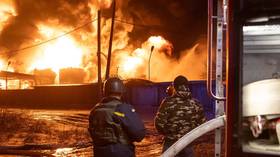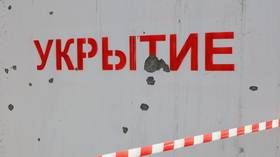Russian expert says severity of Covid-19 may increase with 2nd wave, expects virus to stick around until at least summer 2021
Now for some bad news. If Covid-19 follows historic patterns it will likely come in three waves and normal life won't resume until the summer of next year. That's according to leading Russian virus expert Mikhail Paltsev.
The scientist told the Telegram channel of the Russian anti-coronavirus internet hotline that historically all viral pandemics occur in three waves. The first is rather strong, the second one is even stronger, and the third is less potent due to the formation of herd immunity.
Professor Palstev reiterated that, for example, the Spanish flu occurred in three waves at the beginning of the last century.“Assuming that in the summer the incidence decreased and there are grounds to presume that it will increase in the fall, then yes, there are three seasons to come,” he told the hotline. “And it is possible to presume that only by the summer of next year will we return to the usual way of life.”
Paltsev is the director of the Center for Immunology and Molecular Biomedicine at the Moscow State University and an academician of the Russian Academy of Sciences.
Also on rt.com Russia has started production of Sputnik V – world's FIRST registered Covid-19 vaccine“It is believed that herd immunity begins to form when over 60 percent of the population have had the disease and when 95 percent have had it the infection disappears,” he explained. “Those are theoretical conclusions, but they are confirmed by the majority of authors, including practicing doctors. We’ll see. The virus is new, that is why it is necessary to study, to observe, to accumulate statistics.”
The professor also believes that weakened immunity during self-isolation may cause the second wave to be more severe than it might have been if less stringent measures had been taken. He was answering a question on whether people who observed self-isolation and didn’t get sick in the spring, will have a more severe case of the disease in the fall.
Paltsev added that it seems it's possible to contract the virus more than once, citing evidence of patients with repeat infections both in France and in Russia, “although there are very few of them,” he explained. “That said, it (the coronavirus) is actually mutating but in general only the protein receptors of its membrane are changing while the mutations that show that the coronavirus is becoming more aggressive haven’t been detected.”
According to the latest statistics, over 24,000,000 people have been infected with Covid-19 worldwide and more than 823,000 deaths have been reported. To date, 970,865 coronavirus cases have been confirmed in Russia, with 786,150 patients having recovered from the disease. Russia’s latest data indicates 16,683 fatalities nationwide. Earlier in the year, the Russian government set up an internet hotline to keep the public updated on the coronavirus situation.
Like this story? Share it with a friend!












